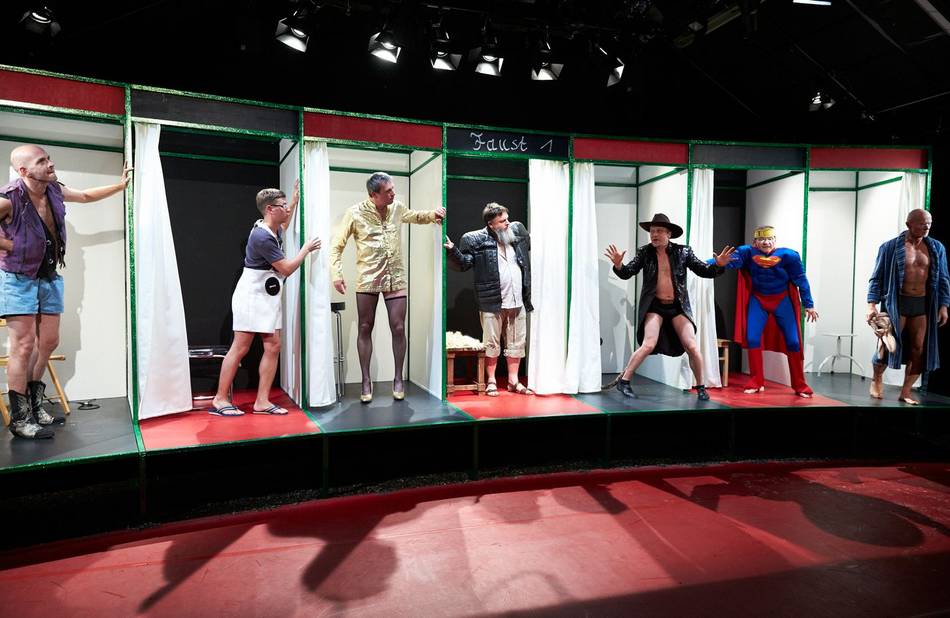2. Civic theatre festival
A german-european theatre festival

In view of the increasing prevalence of participative theatre forms in recent years, a debate about their aesthetic qualities appears timelier than ever. Above all, the question of whether their work will be regarded as a relevant art form in the long term entirely depends on what these newly established civic theatres have to offer.
Together with the Mannheimer Bürgerbühne, the Bürgerbühne Dresden has organized an annual festival for two years, with which it hoped to establish a central forum for presenting and discussing professional theatre with non-professional actors. The artistic programme of the first edition presented twelve relevant productions accompanied by a broadly-scoped symposium for theatre artists, scholars, politicians and journalists. It was conceived as a festival for civic theatre productions, presented at a different European theatre each year. The goal was to promote networking between civic theatres and critically examine the development of participative theatre work.The following productions were invited for the festival in Dresden:
- Die letzten Zeugen (Burgtheater Wien, Regie: Doron Rabinovici und Matthias Hartmann)
- Solo for Lu (Divadlo Archa Theatre Prag, Regie: Jana Svobodá)
- Moeders (Ro Theater Rotterdam, Regie: Alize Zandwijk)
- Requiemachine (Instytut Teatralny Warszawa, Regie: Marta Górnicka)
- Die Klasse (Junges Theater Basel in Koproduktion mit dem Theater Basel, Regie: Sebastian Nübling)
- Woe (Stichting Kata/ Edit Kaldor in Koproduktion mit HAU Hebbel am Ufer, Teatro Maria Matos (Lissabon), STUK (Leuven), Regie: Edit Kaldor)
- Dschingis Khan. Eine musikalische Völkerschau (Monster Truck in Koproduktion mit FFT Düsseldorf, Sophiensaele Berlin, Pumpenhaus Münster und Ringlokschuppen Mülheim, von Monster Truck und Theater Thikwa)
- Dear Moldova, can we kiss just a little bit? (Teatru Spalatorie Chisinau, Regie: Jessica Glause)
- Ich armer Tor (Bürgerbühne Dresden, Regie: Miriam Tscholl)
- Nichts. Was im Leben wichtig ist (Mannheimer Bürgerbühne, Regie: Kristo Šagor)
- Tod. Sünde. 7 (Junges DT Berlin, Regie: Wojtek Klemm)
- Eine (Mikro)Ökonomische Weltgeschichte, getanzt (Volkstheater Karlsruhe, Regie: Pascal Rambert)
- Romeo og Julie lever! (Borgerscenen Aalborg, Regie: Minna Johannesson)
Artistic directors: Miriam Tscholl, Burkhard Kosminski
Curators: David Benjamin Brückel, Stefanie Bub, Jan Linders, Jens Christian Led, Birgit Lengers, Miriam Tscholl
Artists: Bürgerbühne Dresden (Staatsschauspiel Dresden) – Ich armer Tor (I, Poor Fool) based on Goethe’s “Faust” with Dresden men in mid-life crisis – Director: Miriam Tscholl; Bürgerbühne Mannheim (Nationaltheater Mannheim) – Nichts. Was im Leben wichtig ist (Nothing – What Is Important in Life) by Janne Teller – Director: Kristo Šagor; Volkstheater (Badisches Staatstheater Karlsruhe) – Eine (mikro)ökonomische Weltgeschichte, getanzt (A (Micro-) Economic History of the World, Danced) by Pascal Rambert and Éric Méchoulan – Direction, choreography, set design, lighting: Pascal Rambert; Borgerscenen (Aalborg Teater) (DK) – Romeo og Julie lever! – Director: Minna Johannesson; Junges DT Berlin – Tod.Sünde.7 (Mortal.Sin.7), a play developed by the Junges DT) – Director: Wojtek Klemm
